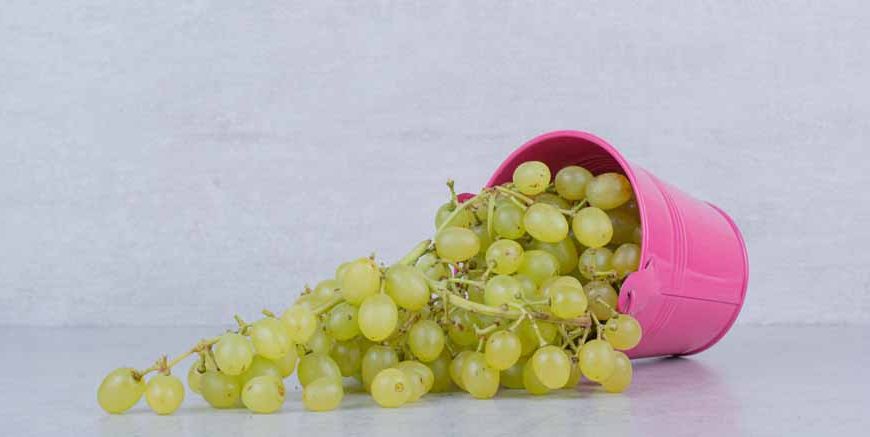Fruits play an essential role in a child’s daily diet, and grapes are one of the most loved choices among little ones. Their natural sweetness, juicy texture, and vibrant colours make them an instant favourite. But beyond taste, grapes are packed with essential nutrients that support a child’s overall growth and development. From boosting immunity in kids to strengthening bones, grapes provide numerous health advantages.
In this blog, we will explore the nutritional value of grapes, the top grape benefits for kids, safe ways to introduce grapes for babies, precautions parents should follow, and fun ideas to make grapes a part of everyday meals.
Nutritional Value of Grapes for Kids
Parents often wonder what makes grapes such a recommended fruit for children. Grapes are more than just a sweet treat, they are a treasure trove of vitamins, minerals, and antioxidants that aid in healthy growth. Rich in vitamin C, they help fight infections, while vitamin K strengthens bones. B6 plays a role in brain development, making grapes a supportive food for both body and mind.
Minerals like potassium and copper regulate body functions and keep children energised throughout the day. Grapes also contain unique antioxidants such as resveratrol and flavonoids, which protect the body from harmful free radicals and reduce the chances of future lifestyle-related illnesses. Their fibre content ensures smooth digestion, preventing constipation, a common concern among kids.
Low in calories yet hydrating due to their high-water content, grapes are the perfect snack option for active, growing children.
Also Read: Barley Health Benefits for Babies
Top Health Benefits of Grapes for Kids
Grapes are more than just a tasty fruit. When added to a child’s daily diet, they contribute to multiple aspects of health and development. Let us dive into the key benefits.
1. Boosts Immunity
One of the greatest benefits for kids is their ability to strengthen immunity. Packed with vitamin C, grapes help children fight common colds and seasonal infections. Parents can consider including a small bowl of grapes during breakfast or as a snack to naturally improve their child’s defence system.
2. Supports Eye Health
Eye health is extremely important for children as they grow. The antioxidants present in grapes, such as lutein and zeaxanthin, protect the eyes from damage caused by free radicals. Regular consumption may help improve vision and reduce eye strain, especially in today’s world where children spend time on screens.
3. Improves Digestion
Thanks to their high fibre content, grapes aid digestion and ensure proper bowel movement. Parents often face the challenge of constipation in young children, and adding grapes can be a simple, natural solution to this issue.
Read more – Natural Home Remedies for Child Indigestion
4. Strengthens Bones
Vitamin K and essential minerals like calcium, magnesium, and potassium make grapes an excellent choice for strengthening bones. During the growing years, strong bones are vital for posture, physical activity, and overall health.
Read more – Why do babies have more bones than adults
5. Keeps Kids Hydrated
Grapes have a high-water content, which makes them naturally hydrating. They are particularly beneficial during the hot summer months, when children lose fluids quickly. Instead of sugary drinks, parents can encourage Hydration for Toddlers by offering grapes as a refreshing and healthy snack.
6. Supports Brain Health
Grapes are rich in polyphenols, which support brain functions such as memory and concentration. Including grapes in a child’s diet may help with focus and learning, especially during school years when children are rapidly developing academically.
Also Read: Dates Health Benefits for for Kids
Grapes for Babies – What Parents Should Know
When it comes to grapes for babies, parents need to be careful. Grapes are highly nutritious, but they can also pose a choking hazard if not prepared correctly. It is usually safe to introduce grapes after the age of 10-12 months, but always cut them into halves or quarters before serving.
Green or red seedless grapes are the best choice for babies, as they are easier to chew and swallow. Parents should avoid giving whole grapes to babies and toddlers. Serving suggestions include mashing grapes, mixing them with soft yoghurt, or adding tiny pieces to purees. Grapes should also be introduced gradually to observe any allergic reactions, though such cases are rare. Introducing grapes early in a safe manner ensures that children develop a taste for this healthy fruit.
How to Safely Serve Grapes to Kids

Safety is paramount when serving grapes to children. Parents should always wash grapes thoroughly to remove pesticides or dust before giving them to children. For toddlers, grapes must be cut into halves or quarters to avoid choking hazards. It is best to avoid unripe or very hard grapes for younger children, as they can be difficult to chew.
For older children, grapes can be enjoyed whole, but supervision during snack time is always encouraged. Parents can make it a habit to serve grapes alongside other fruits to build variety while maintaining safety.
Also Read: Jackfruit Health Benefits for Kids
Fun Ways to Add Grapes to Your Child’s Diet
Children may sometimes get bored of eating plain grapes. To keep things exciting, parents can try fun and creative ways to include grapes in meals. Frozen grapes can be offered to older kids as a refreshing summer snack. Grapes also make a colourful addition to fruit salads, which children often enjoy.
Yoghurt parfaits with layers of yoghurt, granola, and grapes can make snack time both tasty and healthy. For a quick breakfast or after-school treat, a grape smoothie with bananas and yoghurt is not only delicious but also nutrient-packed. These variations ensure that kids look forward to eating grapes regularly.
Precautions When Giving Grapes to Kids
While grapes are beneficial, parents must be aware of a few precautions. Whole grapes can be a choking hazard, especially for toddlers and preschoolers. Always ensure they are cut into smaller pieces. Although rare, some children may be allergic to grapes, so it is wise to watch out for reactions such as rashes or stomach discomfort when introducing grapes for the first time. Additionally, too many grapes at once may cause stomach upset due to their fibre content. Moderation is key when it comes to serving grapes to children.
How EuroKids Encourages Healthy Eating
At EuroKids, we believe in shaping lifelong healthy habits right from the early years. Our curriculum includes balanced snack times where children are introduced to different fruits and vegetables, including grapes. Through fun lessons, activities, and storytelling, children learn about the importance of nutrition in an engaging way.
We encourage children to try new foods, share healthy meals with their peers, and gradually develop a liking for fruits like grapes. By combining education with play, EuroKids ensures that children not only enjoy their meals but also understand their benefits.
Also Read: Health Benefits of Walnuts for Kids
FAQs
Are grapes good for kids’ health?
Yes, grapes are excellent for kids. They boost immunity, improve digestion, strengthen bones, and support brain development while keeping children hydrated.
At what age can babies start eating grapes?
Babies can usually start eating grapes after 10–12 months, provided they are cut into small pieces to avoid choking hazards.
Which type of grapes is best for kids?
Seedless grapes, either green or red, are the best choice for children as they are easier to chew and safer to eat.
Can grapes improve brain health in kids?
Yes, grapes contain polyphenols that may support memory and focus, making them a brain-friendly snack.
Do EuroKids promote healthy eating habits?
Absolutely. At EuroKids, children are encouraged to eat balanced, nutritious snacks and are introduced to healthy food choices in a playful and interactive way.
Conclusion
Grapes are one of the simplest yet most powerful additions to a child’s diet. From strengthening immunity and bones to supporting digestion and brain health, the benefits of grapes make them an essential fruit for kids of all ages. With safe preparation methods and creative serving ideas, parents can make grapes a favourite part of everyday meals.
At EuroKids, we are committed to guiding children towards healthy eating habits through fun and interactive learning methods. If you are a parent looking to give your child the best start in life, explore the wide range of programs we offer. To know more, visit the EuroKids Admission Page.
If you are an entrepreneur passionate about education, discover how you can make a difference in children’s lives by joining us through the EuroKids Franchise Page. For more parenting insights, activities, and health-related tips, explore the EuroKids Blogs Page. Together, let’s nurture healthier, happier children.
Related Blogs
Health Benefits of Honey for Kids
Honey is more than just a natural sweetener, it’s packed with antioxidants and has antibacterial properties that help boost children’s immunity. This blog explores safe ways to introduce honey to kids’ diets, age-appropriate usage, and why it should never be given to infants under one year.
Jaggery Health Benefits for Babies
Known as a traditional superfood, jaggery provides essential minerals like iron and magnesium. This article discusses how jaggery helps prevent anaemia, supports digestion, and can be a healthier alternative to refined sugar for babies when introduced in moderation.
Health Benefits of Pineapple for Kids
Pineapple is rich in vitamin C, fibre, and bromelain, making it excellent for digestion and immunity. In this blog, parents can learn creative ways to include pineapple in kids’ meals while understanding precautions to avoid allergic reactions in young children.
Sweet Potato Health Benefits for Baby
Sweet potatoes are a wholesome first food for babies, offering beta-carotene, fibre, and complex carbohydrates. This post explains how sweet potatoes aid in vision development, gut health, and sustained energy for growing infants.
Peaches Health Benefits for Babies
Soft, juicy peaches are easy for babies to digest and provide vitamins A and C. This blog highlights their role in boosting immunity, supporting skin health, and introducing natural sweetness into a baby’s diet.
Cucumbers for Kids: Nutritional Benefits and Recipes
Cucumbers are refreshing, hydrating, and loaded with vitamins. This blog not only explains their nutritional value but also shares fun cucumber-based snack recipes to encourage healthy eating habits in children.
Kiwi Fruit & Its Health Benefits for Kids
Kiwis are small but nutrient-dense, offering vitamin C, antioxidants, and fibre. This article shows how kiwi supports immunity, digestion, and overall wellness while giving tips on introducing it safely to kids’ diets.
















